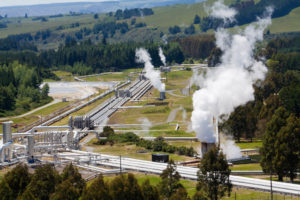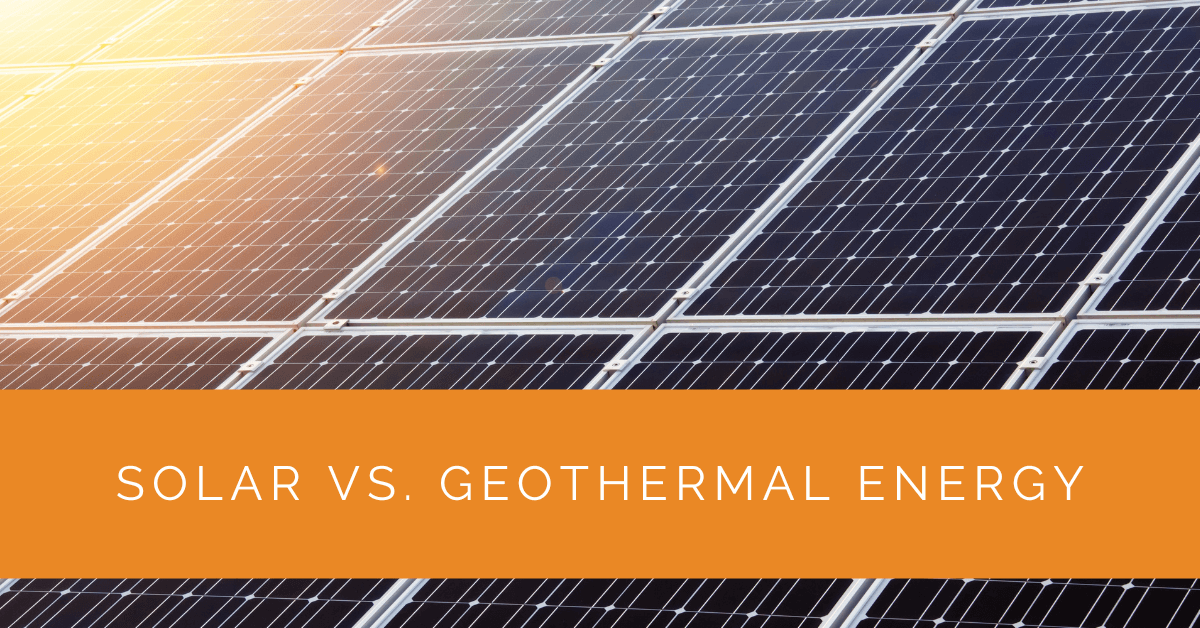Renewable energy sources have become increasingly popular, with solar and geothermal energy leading the way. This article will delve into a detailed comparison of solar and geothermal energy, exploring their features, benefits, and applications.
Contents
- 1 Key Takeaways
- 2 Understanding Solar Energy
- 3 Understanding Geothermal Energy
- 4 Heat and Cool: Solar Thermal vs Geothermal Heat Pumps
- 5 Solar Energy and Geothermal Energy: Cost and Efficiency
- 6 Environmental Impact and Sustainability
- 7 Applications and Limitations
- 8 Choosing the Right Energy Source
- 9 Expert Insights From Our Renewable Energy Specialists
- 10 Experience Solar Excellence with Us!
- 11 Conclusion
Key Takeaways
- Solar energy and geothermal energy are renewable sources with distinct applications and benefits.
- Solar energy is versatile, accessible, and suitable for power generation, heating, cooling, and portable applications.
- Geothermal energy offers reliable heating, cooling, and power generation, but its implementation depends on the availability of geothermal resources and geological considerations.
Understanding Solar Energy
Solar energy is derived from the sun and is converted into usable electricity through solar panels. Solar panels capture sunlight and convert it into electrical energy. This renewable energy source offers many applications, including power generation, heating, cooling, and more.
Solar panels are typically installed on rooftops or open spaces, allowing them to harness sunlight and generate electricity. The photovoltaic (PV) cells within the panels absorb photons from the sunlight, initiating a flow of electrons that generates direct current (DC) electricity. This DC electricity is then converted into alternating current (AC) electricity used to power homes, businesses, and industries.
Understanding Geothermal Energy
Geothermal energy is derived from the Earth’s heat and is considered one of the most consistent renewable energy sources. It harnesses the natural heat produced by the Earth’s core and transfers it to the surface for various applications. Geothermal energy is primarily utilized for heating, cooling, and power production.
Geothermal heat pumps are a common application of geothermal energy for heating and cooling purposes. These systems utilize the Earth’s stable temperature to provide efficient heating and cooling for residential and commercial spaces. Geothermal heat pumps transfer heat from the ground to the building during winter and vice versa during summer, ensuring a comfortable indoor environment year-round.

Heat and Cool: Solar Thermal vs Geothermal Heat Pumps
Solar thermal systems and geothermal heat pumps offer effective solutions for heating and cooling.
Solar Thermal Systems
Solar thermal systems use sunlight to heat water or air for residential and commercial spaces. These systems typically consist of solar collectors that absorb solar radiation and transfer the captured heat to a fluid, which is then used for heating. Solar thermal systems are especially suitable for providing hot water for domestic use, space heating, and swimming pool heating.
Geothermal Heat Pumps
Geothermal heat pumps utilize the Earth’s heat for efficient heating and cooling. They extract heat from the ground during winter and transfer it indoors, while during summer, they remove heat from indoor spaces and transfer it back to the ground. Geothermal heat pumps rely on a closed-loop system containing a heat exchanger and a refrigerant to facilitate heat transfer. These systems are known for their high energy efficiency and reliable performance.
Both solar thermal systems and geothermal heat pumps offer advantages in terms of sustainable heating and cooling solutions. Solar thermal systems are particularly suitable for regions with abundant sunlight, while geothermal heat pumps provide consistent heating and cooling performance regardless of weather conditions.
Solar Energy and Geothermal Energy: Cost and Efficiency
Several factors come into play when considering the installation and operational costs and the overall efficiency of solar and geothermal energy systems.
Solar Energy Systems
The cost of solar energy systems primarily depends on the size of the installation, the quality of the equipment used, and the project’s complexity. Solar panels have become increasingly affordable in recent years, and numerous financial incentives, such as tax credits and rebates, are available to encourage their adoption.
Solar panels have witnessed significant advancements in efficiency, with modern panels achieving high conversion rates. The efficiency of solar panels is typically measured by their ability to convert sunlight into electricity. Factors such as panel quality, temperature, shading, and orientation can impact the overall efficiency of a solar energy system.
Geothermal Systems
Geothermal systems generally require a higher upfront investment compared to solar energy systems. The installation involves drilling boreholes or trenches to access the geothermal heat beneath the Earth’s surface. The costs associated with drilling and installation can vary based on site accessibility, ground conditions, and system size.
However, geothermal systems offer significant long-term benefits and cost savings. Geothermal heat pumps are highly efficient, providing more energy output than electricity input required to operate them. The Earth’s stable temperature allows geothermal systems to deliver consistent heating and cooling performance throughout the year. Additionally, geothermal systems have a longer lifespan compared to many other heating and cooling technologies, reducing the need for frequent replacements.
It’s worth noting that the overall cost and efficiency of both solar and geothermal systems can vary depending on individual circumstances, such as geographical location, available resources, and energy consumption patterns. Consulting with professionals and conducting a thorough assessment of the specific project requirements are essential in determining the most cost-effective and efficient solution.

Environmental Impact and Sustainability
Both solar and geothermal energy are considered green energy sources, offering substantial environmental benefits compared to traditional fossil fuel-based energy generation.
Solar Energy
Solar energy is a clean and renewable energy source that produces no greenhouse gas emissions during operation. Solar energy significantly reduces reliance on fossil fuels and helps mitigate climate change by generating electricity from sunlight. Solar panels have a long lifespan and can be recycled at the end of their service life, minimizing environmental impact.
Geothermal Energy
Geothermal energy is also a sustainable and environmentally friendly energy source. Geothermal systems emit minimal greenhouse gases during operation, making them a cleaner alternative to conventional heating and cooling methods. The heat extracted from the Earth’s core is continuously replenished by natural processes, ensuring a virtually inexhaustible supply of geothermal energy.
Additionally, geothermal systems do not require combustion or the use of fossil fuels, eliminating associated air pollution and reducing dependence on non-renewable resources. Geothermal energy systems have a small physical footprint, minimizing land disturbance and preserving natural habitats.
Applications and Limitations
Both solar and geothermal energy have specific applications where they excel, as well as certain limitations to consider.
Solar Energy Applications
Solar energy is versatile and widely applicable in various sectors. Some of the key applications include:
- Solar panels for residential, commercial, and industrial power generation
- Solar water heating systems for domestic and commercial hot water production
- Solar-powered outdoor lighting for parks, streets, and public spaces
- Solar-powered charging stations for electric vehicles
- Solar-powered devices and gadgets for portable power needs
While solar energy is highly accessible and scalable, its effectiveness can be influenced by factors such as sunlight availability, shading, and panel orientation. Solar energy may not reach its maximum potential in regions with limited sunlight.
Geothermal Energy Applications
Geothermal energy is primarily utilized for heating, cooling, and power generation. Some key applications include:
- Geothermal heat pumps for residential, commercial, and industrial heating and cooling
- Geothermal power plants for electricity generation
- Geothermal district heating systems for large-scale heating applications
- Geothermal spas and pools for recreational and therapeutic purposes
Geothermal energy is most effective in areas with accessible geothermal resources, such as regions near tectonic plate boundaries or volcanic activity. While geothermal energy can provide reliable heating and cooling, its implementation may be limited by geological constraints and the need for specialized drilling equipment.
Choosing the Right Energy Source
When deciding between solar and geothermal energy, several factors should be considered:
- Energy Needs: Assessing the specific energy requirements for heating, cooling, or power generation is essential. The energy demands of a residential homeowner may differ from those of a commercial facility or an industrial operation.
- Geographical Location: The availability of sunlight and geothermal resources in a particular area should be evaluated. Geographical characteristics, climate conditions, and geological surveys can help determine the suitability of solar or geothermal energy.
- Available Resources: Consider the resources at your disposal, such as space for solar panels, access to geothermal wells, and financial incentives or grants specific to solar or geothermal installations.
- Project Feasibility: Conduct a comprehensive feasibility study to assess each energy source’s technical, economic, and environmental viability. Infrastructure costs, maintenance requirements, and potential long-term savings should be evaluated.
- Consult Professionals: Seek guidance from experts in the field of renewable energy. Solar and geothermal energy professionals can provide valuable insights, conduct site assessments, and help you decide based on your needs and circumstances.
Expert Insights From Our Renewable Energy Specialists
Choosing between solar and geothermal energy depends on various factors such as location, energy needs, and available resources. Each has its own strengths and optimal applications.
Renewable Energy Consultant
Solar energy is incredibly versatile and accessible, making it a great option for residential and commercial use. Geothermal energy, while more site-specific, offers unparalleled efficiency for heating and cooling.
Senior Energy Engineer
Integrating both solar and geothermal systems can provide a comprehensive renewable energy solution, maximizing the benefits of both technologies.
Sustainable Energy Specialist
Experience Solar Excellence with Us!
Trust in Solar Panels Network USA, where our seasoned experts deliver top-quality solar solutions for homes and businesses nationwide. With a legacy of countless successful installations and a commitment to sustainable energy, we’re your reliable partner in the solar journey. Ready for a brighter, eco-friendly future? Call us now at (855) 427-0058 and harness the power of the sun!
Conclusion
Both solar and geothermal energy offers significant benefits as renewable energy sources. Solar energy harnesses sunlight to generate electricity, while geothermal energy utilizes the Earth’s heat for heating, cooling, and power production. Each energy source has unique applications, cost considerations, environmental impact, and geographical requirements.
Choosing the right energy source depends on various factors, including energy needs, location, available resources, and project feasibility. By carefully evaluating these factors and consulting with experts, homeowners, businesses, and industries can make informed decisions to embrace sustainable and efficient energy solutions. Whether through solar or geothermal energy, the transition to renewable sources contributes to a greener future with reduced carbon emissions and long-term energy sustainability.
About the Author
Solar Panels Network USA stands at the forefront of solar energy solutions, driven by a team of seasoned solar engineers and energy consultants. With over decades of experience in delivering high-quality solar installations and maintenance, we are committed to promoting sustainable energy through customer-centric, tailored solutions. Our articles reflect this commitment, crafted collaboratively by experts to provide accurate, up-to-date insights into solar technology, ensuring our readers are well-informed and empowered in their solar energy decisions.

